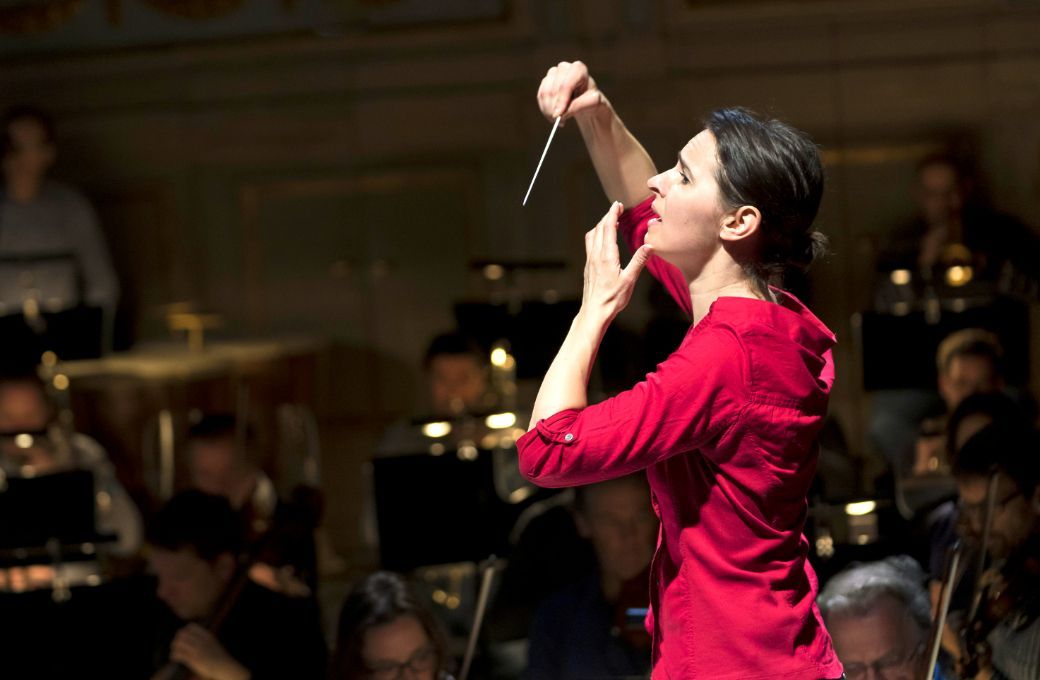This Philharmonia matinee was billed as “Benjamin Grosvenor plays Chopin II”, a sequel to his First Piano Concerto with them before Christmas. And the young British pianist gave an excellent performance, self-contained, non-flashy, his touch ranging from delicate to muscular. He deployed rubatos sparingly, occasionally teasing the musical line but never distorting it; a model of good taste. This was an immaculate, unflappable account, Grosvenor even maintaining his cool as a rogue hearing aid in the audience whistled its accompaniment. But in truth, the afternoon belonged to Ukrainian conductor Oksana Lyniv, making her UK concert debut.

Having been impressed with Lyniv’s work viewed via streaming during lockdown, I was disappointed by her Royal Opera debut (a bloated Tosca in December 2021). Amends were truly made here though, particularly with a Tchaikovsky Pathétique that left me a puddle of my former self.
First came another encounter with Boris Lyatoshynsky. After hearing his Third Symphony at the Barbican last month, conducted by another Ukrainian, Kirill Karabits, Lyniv programmed the symphonic ballad, Grazhyna. Based on Polish poet Adam Mickiewicz's Grażyna, it tells the tale of a Lithuanian princess who leads her people against the invading forces of the Order of Teutonic Knights. The Lithuanians are victorious, but Grazhyna is killed. Despite Henry Clay's beautiful cor anglais solo, which later returns to close the work, the music is dramatic, brassy and unsubtle. Traces of Lyatoshynsky’s teacher, Reinhold Glière, can be detected, in particular his Third Symphony, “Il’ya Muromets”. Lyniv, conducting with a clear beat and flowing gestures, martialled the great battle at the centre well, before a noble funeral march and the work’s gradual subsidence into nothingness.
There’s a gradual subsidence into nothingness at the end of Tchaikovsky’s Pathétique Symphony, but the journey there is longer and more harrowing. From Robin O’Neill’s gruff, grainy bassoon lament at the symphony’s opening, it was clear how deeply Lyniv feels this score, a no holds barred approach that wore its heart on its sleeve. The first movement was very slow. There was no stinting on the brass, sandblasting their despair in the Allegro vivo development section, Lyniv rightly urging them on – the dynamic marking for the trombones here is ffff! – to the orchestral equivalent of a long anguished scream.
The inner movements went at a lithe tempo. The lopsided 5/4 Valse was taken at a nice clip, Lyniv crouching to hush the strings but without falling into the trap of relaxing the pace. There was little sense of triumph in the third movement, a cold, glassy-eyed march – stoic, unsmiling – emerging from the woodwind bustle. A dramatic page turn at its brassy conclusion signalled Lyniv’s intention to launch into the finale attacca, a headlong plunge into the abyss. The string playing here was big and emotional, if not always entirely clean. Gravelly horns and meticulous attention to Tchaikovsky’s push-pull tempo markings drove us to the bleak final pages, the strings pared down, section by section, to just cellos and basses, fading into pppp inaudibility. Lyniv lowered her arms early, but the silence was maintained for a good 30 seconds before anyone dared breathe again. Even then, Lyniv, visibly moved, didn’t look ready to face the storm of applause. A most distinguished debut and I hope she is invited back often.


